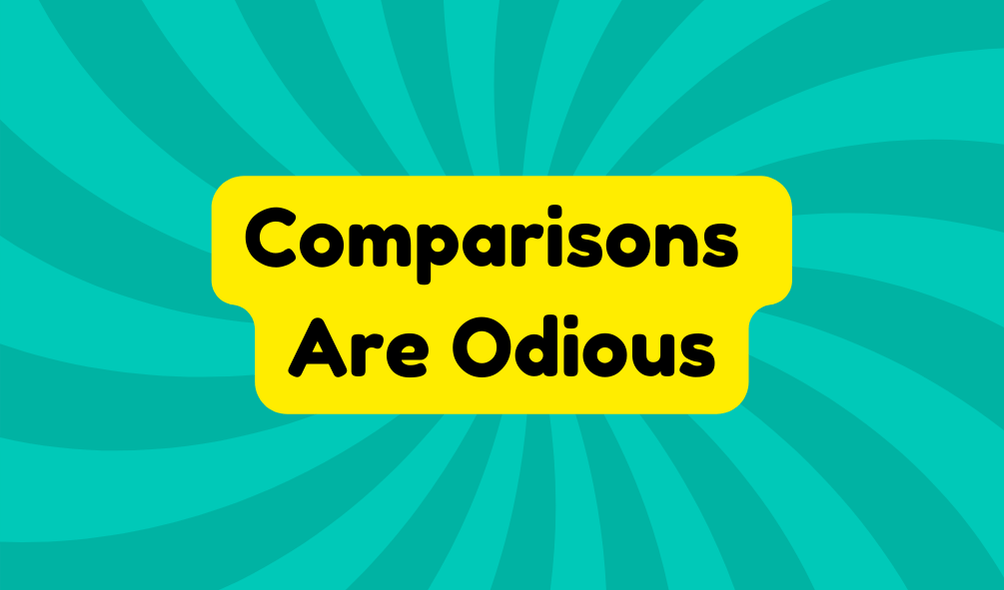The phrase "comparisons are odious" suggests that comparing individuals often leads to adverse effects like resentment and envy. Such comparisons can overshadow unique qualities, fostering negative feelings in relationships. This sentiment dates back to the 15th century and has appeared in works by prominent literary figures. Today, the rise of social media exacerbates these issues, promoting unrealistic standards and deteriorating self-esteem. Understanding this concept fully highlights its relevance in contemporary society, inviting further exploration into its implications.
Synonyms
When exploring the topic of comparisons, one might find it enlightening to contemplate its synonyms, which offer alternative expressions that capture the essence of this complex social behavior. Terms like "juxtaposition," "contrast," and "differentiation" not only enrich discussions but also provide pathways for deeper understanding.
- Juxtaposition: Emphasizes differences without negative connotations.
- Contrast: Highlights distinctions, fostering objective observation.
- Differentiation: Encourages appreciation of unique qualities without bias.
These alternatives allow for a more nuanced, comparative analysis, promoting awareness of subjective perceptions inherent in social evaluations and reminding individuals of the intricacies involved in judging one another.
Example of Sentences
Understanding the complexities of comparisons can sometimes lead to discomfort, especially in everyday discourse. Examples provided illuminate this point:
- "Her performance was neat, but comparing it to his seems unfair."
- "While their achievements are notable, pitting them against one another breeds resentment."
- "Choosing one favorite dish over another can unintentionally offend."
These practical applications highlight how comparisons often overlook individual merits, breeding negativity rather than appreciation. Ultimately, fostering an environment where everyone is valued independently encourages innovative discussions and growth. Recognizing the limitations of comparisons might pave the way for more collaborative and supportive interactions.
Origin
The phrase "comparisons are odious" has an intriguing origin, rooted in the early 15th century. Its etymological roots trace back to John Lydgate, who documented its essence around 1440, stating, "Odyous of olde been comparisonis." This sentiment permeated literature, evident in works by Cervantes, Marlowe, and Shakespeare, highlighting the negative impact of comparisons on human relationships. As society evolved, so did the phrase, serving as a cultural mirror reflecting attitudes toward judgment and rivalry. Literary references underscore the timelessness of this warning against comparison, urging appreciation of individuality rather than fostering envy through unfavorable comparisons.
Collocations
Exploring the phrase "comparisons are odious" reveals a rich tapestry of collocations that have emerged around it. These phrases highlight the inherent comparison pitfalls and challenge the validity of comparisons. Here are three notable collocations connecting to this theme:
- Toxic Comparisons – Emphasizes the damaging effects of unfavorable comparisons.
- Constructive Comparisons – Encourages assessments that promote growth and understanding.
- Invalid Comparisons – Points out the flaws in comparing dissimilar entities.
Such collocations serve as reminders that while healthy comparisons can inspire, they must be navigated carefully to avoid unintended negativity and discontent.
How to Use in Everyday Language
In many everyday situations, individuals often fall into the trap of making comparisons, whether in casual conversations or social media interactions. This tendency can undermine social dynamics, leading to jealousy and discontent. Instead of rating worth based on others, people are encouraged to explore practical applications of appreciation, celebrating unique qualities. Words like "innovative" and "remarkable" can replace comparative phrases, fostering a more positive dialogue. By adopting this mindset, individuals can enhance their interactions while rejecting the urge to rank. Ultimately, embracing individuality over comparison nurtures healthier relationships, supporting an environment of acceptance and respect among peers.
Why Is It Still Relevant Today?
Making comparisons remains a pervasive issue in today's society, particularly with the rise of social media and constant connectivity. This phenomenon adversely affects self-esteem, as individuals frequently measure their worth against curated online personas. The influence of social media fosters an environment ripe for envy and dissatisfaction, making the phrase "comparisons are odious" more relevant than ever.
| Aspect | Impact on Self-Esteem | Social Media Influence |
|---|---|---|
| Constant Comparisons | Decreased confidence | Amplification of ideals |
| Selective Showcase | Misleading standards | Unrealistic expectations |
| Envy and Resentment | Emotional distress | Viral spread of discontent |
| Idealization | Sense of inadequacy | Pressure to conform |
| Balance and Acceptance | Cultivating self-worth | Promoting authenticity |







